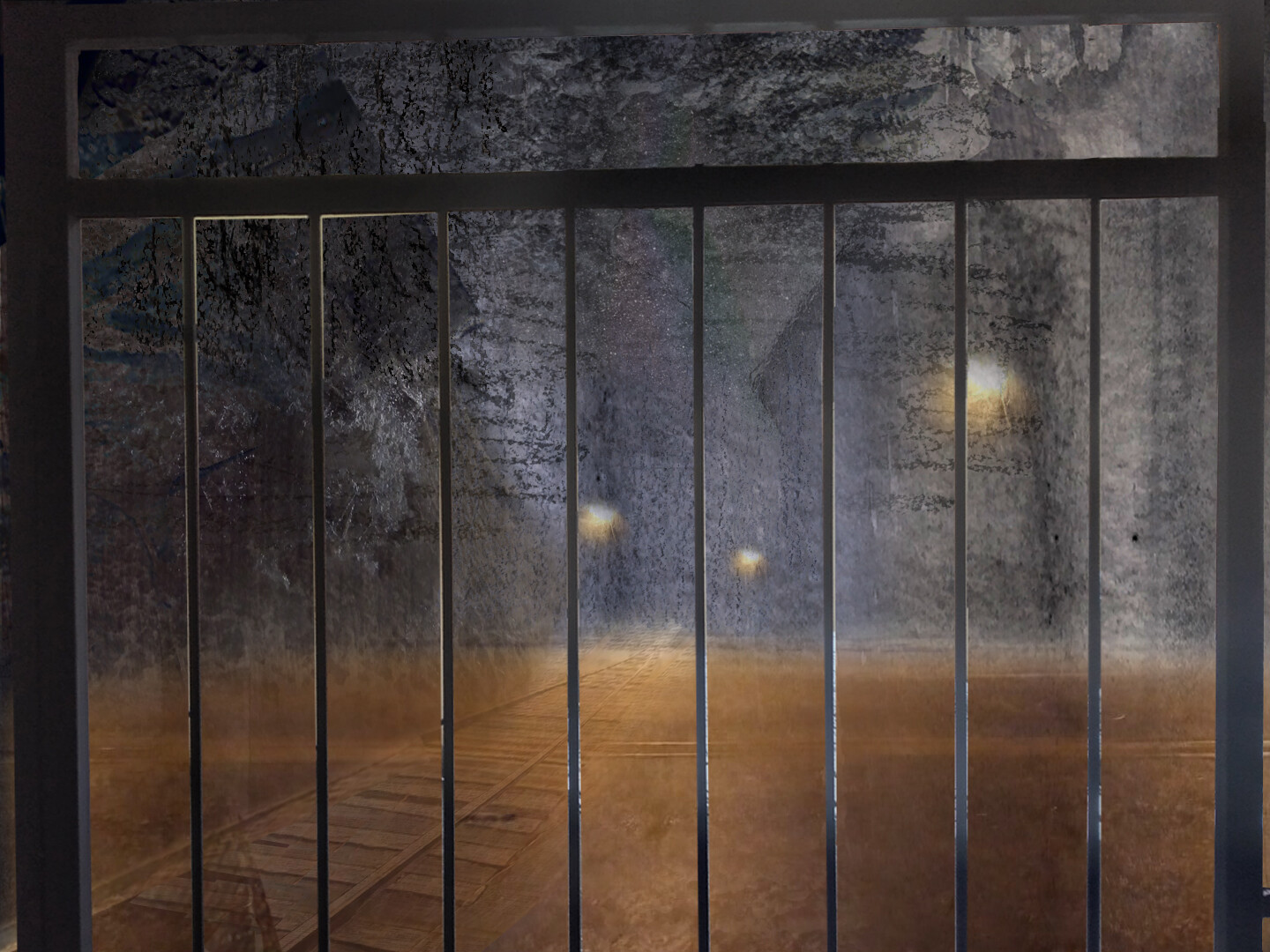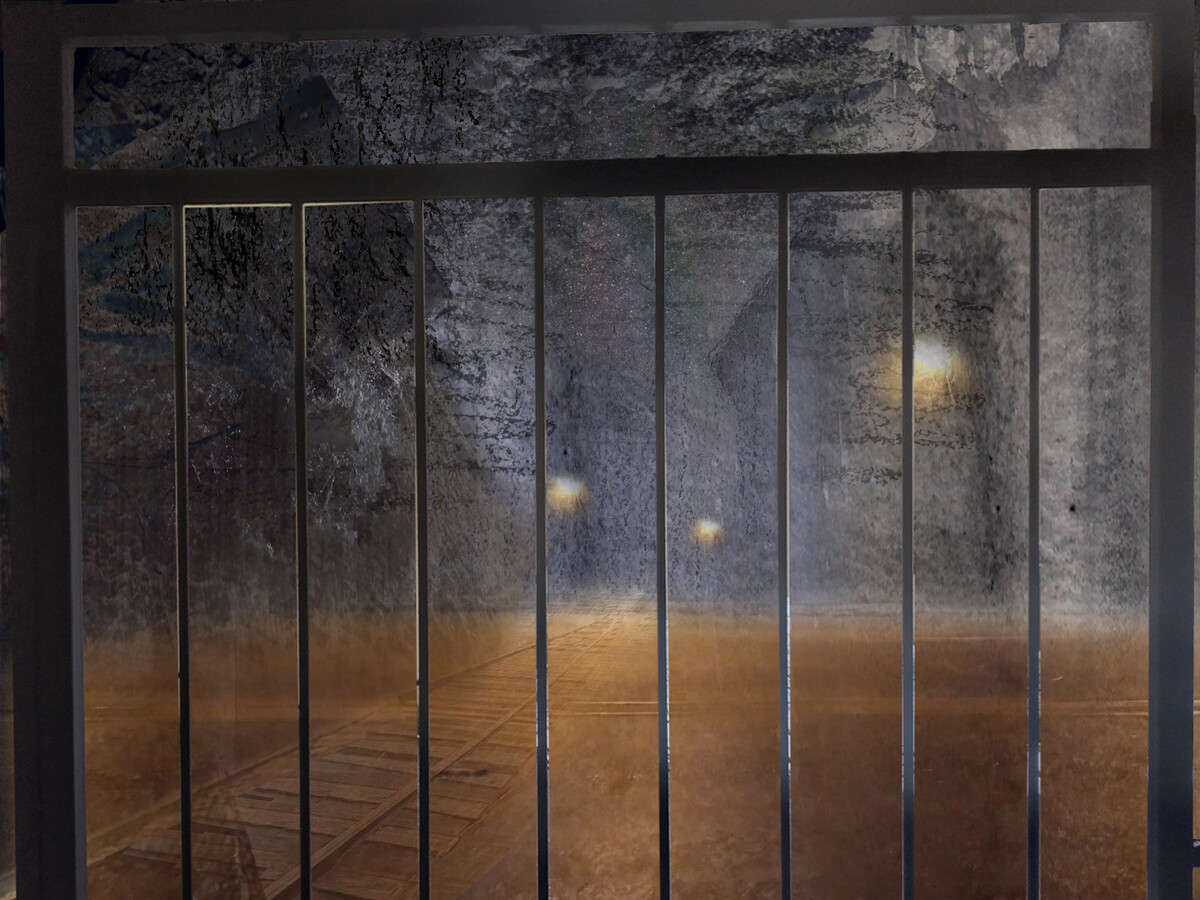

Still from animation Descent into the Mine, part of four-channel video installation Canary Archives by Chto Delat (realized by Maria Dubrovina and Polina Zaslavskaya).
The situation in Russia, since the beginning of military aggression, is usually described as a humanitarian catastrophe. Not in the sense of the destruction of cities and the killing of people (as is happening in Ukraine), but as an existential catastrophe—falling out of the civilized world. Russia is described as descending into savagery, as a place for monsters, devoid of basic human decency. Even its culture in various forms, sometimes latently, sometimes openly, is a manifestation of this inhuman horror, an open funnel to hell. There is nothing to save, as they say. It remains only to repeat: “God, just burn it.” Even the possibility of repentance, which was extended to Germany in the twentieth century, is called into question when it comes Russia. At least Germans were Europeans.1
War and repression have created a huge wave of refugees leaving Russia. Many of them are in real danger, while others have left because this widespread narrative, which has a long history, makes them afraid to stay. These residents of Russia—whom Western colonial thinking mistakenly identifies as all “Russians”—are leaving the country in a state of panic, trying to avoid being sucked into this hellish funnel.
Once outside of Russia, these people who are leaving the country can do a lot to help refugees from Ukraine, or to build new cultural projects. But even there they cannot avoid the “common fate” of all those who share their place of origin—falling out of the civilized human community.
Many have convincingly disputed this ideological construction. But it is worth recognizing that with the outbreak of war, it has been adopted by people at many levels. And even those who may have criticized this elitist view in the past now share it.
But now let’s talk about those who have decided to stay in Russia.
It is important to say that for many millions, leaving is not an option. They are bound by the responsibility to care for ill loved ones, or by a lack of financial resources, or a lack of documents, or psychological limitations—the list goes on. They had no choice to stay or flee, and many of them live in a state of nightmare, sharing the ideological construction described above.
But there are those who consciously resist this imposed picture, who question the easy separation between “pure and impure,” as Adorno would say, who insist on political and ethical complication. Such people are ready to consciously preserve a different vision of the country and its history, ready to do the necessary work of decolonization and humanization right where they are. They share the hope that we can and should take responsibility for the continuation of life on our land, and that we should resist, defending the possibility of renewal not for the elite but for all those who are now hostage to Putin’s repressive war machine.
We have very few opportunities for public actions or to release public statements. We are in a fluid situation—a transition from an authoritarian to a totalitarian regime of social control. So far it is not clear how this new totalitarianism will operate in the digital age or how the Chinese model would work here given the relative dysfunctionality of the Russian state. It is worth studying past examples of counter-public spheres (Nancy Fraser),2 such as confidential spaces of dissent in the Soviet Union, Poland, and other countries, as well as the experiences of alternative spaces in Turkey, Iran, and other countries with similar histories.
But we must understand that the situation we face is completely unique and fluid. What worked yesterday may no longer work today, and the constant change in people’s psychological and social moods makes it impossible to build clear organizational structures. That is why we need to learn how to act in a state of emergency, which we loved to read about for so long, and which we always knew was really a permanent state of emergency.
I’m not ready to argue with those who demand more militancy or visible resistance from those of us remaining in Russia. If some people choose to do this, they are heroes. I hope there will be more of them when this crisis inevitably deepens.
But in order for more heroes to rise up, it is important to create an environment that supports them—spaces for safe communication, psychological help, legal protection, and mutual aid. Spaces where artistic statements can be safely drafted together. Such spaces exist but it is important to create more of them—spaces where discussions are possible, where uncensored speech is possible, where it’s possible to reproduce new forms of life that will be urgently needed after all of this is over.
That is why we have decided to continue our pedagogical and artistic work in the form of new communal projects.3 For one, we will create a summer emergency commune as part of The School of Engaged Art. This dissident initiative is our response to the unfolding militaristic, humanitarian, and economic catastrophe. It is also one possible answer to the eternal question of whether art and thought are possible during a catastrophe. Following Benjamin, we know that modern history is already one long catastrophe, that a new escalation is only a continuation of the historical tragedy of people’s lives, and that only a clear understanding of the tragedy of being gives us hope for the continuation of life. Anyone who has realized the catastrophic state of the world takes a step away from this cycle of violence.
It might be said that now is not a time for hope—in an escalating situation, where violence is celebrated, gentler voices may sound naive, vulnerable, and weak. But this position is important in its own way and is worth defending at a time when most people are betting on violence, fascism, and war.
Art historian and curator Nadezhda Plungyan posted this statement on her Facebook page:
The wind of history is blowing in Russia, and all internal structures have obviously been devalued and cancelled. Yes, according to the old memory, they can still be used, but this does not solve anything, does not provide any guarantees or protection.
In conditions when there is no “majority,” the strategies that make it possible to survive / live and work here are again the strategies of the author, a loner, a figure split off from any major movements. Constant monitoring of your choice. Not a search for “prospects,” but a dive into the depths.4
While her position is understandable, we must say that it is wrong in many respects. The survival strategy now can only be collective. The “author and the loner” are no more—they belong to the same normative, institutionalized past that Plungyan criticizes later in her post.5 They no longer exist because the political, psychological, and economic pressure has become so extreme, and no one individual can withstand it alone. Only by uniting do we have a chance to live and work with any depth—and, if we are lucky, rise to the surface.
There is a small contradiction here—despite the fact that Russia is constantly accused of barbarism, falling out of “Western civilization,” but then for some reason all comparisons (ideological, ethical, historical, political) are almost completely exhausted by Nazi Germany. At the same time, it somehow does not reflect that historical fascism is a well-described infection of European origin.
The idea of the counter-public sphere was the basis for the Chto Delat projects Rosa’s House of Culture (2015) and The School of Engaged Art (2013).
For one of our past communal projects, see the Chto Delat publication Another Commons: Living / Knowledge / Action, 2009 →.
See →.
“In the West, nothing has changed and everything is the same: there is ‘activism,’ ‘social life,’ ‘profession,’ ‘position’—clear cells, based on which you are invited to define yourself again in the face of the academy and the press of the 2010s. But the continuous and living decay of everything cannot be placed in any pre-prepared semantic container. New forms of resistance and self-awareness, which are perceived with interest ‘here,’ are simply not recognized ‘there’ as significant … It is true that the crisis of social thought in the world in the past decades also consisted in this demand for ready-made, pre-known answers, but now this pressure is drying up and it will never return to any previous places. It will not return, because there is no longer any motivation to explain this experience to an external observer. But the voice of the landscape is clearly audible, as in the era of all changes.”
